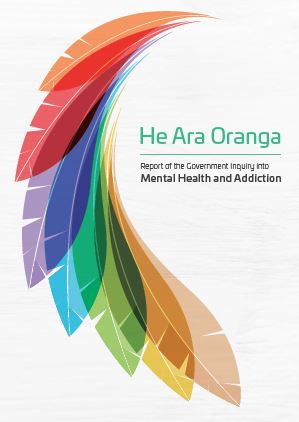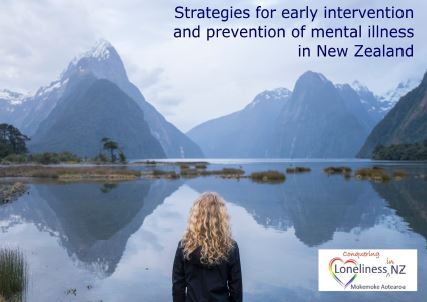Mental health and loneliness
In 2019, Treasury analysis showed a strong association between mental health, wellbeing, and loneliness. Consistent with this strong connection, Loneliness NZ made a detailed submission to the Mental Health Inquiry in 2018. Given the many challenges faced in the mental health sector, the Mental Health Inquiry did not make any recommendations directly related to addressing loneliness.
Treasury wellbeing analysis on mental health and loneliness
Treasury highlighted on their blog in July 2019 new wellbeing analysis on mental health and loneliness. The analysis is in the analytical paper Wellbeing and mental health: An analysis based on the Treasury’s Living Standards Framework. The Treasury paper found:
- Loneliness is strongly associated with low mental health wellbeing, and mental health was strongly associated with life satisfaction (a measure of overall wellbeing);
- Mental health referrals are associated with low life satisfaction, low job wellbeing, low mental health wellbeing, and loneliness; and
- Users of mental health services have high rates of low mental health wellbeing, low life satisfaction, and loneliness.
The paper could only identify associations between the various domains of wellbeing and interactions with government, rather than identifying causal relationships.
Loneliness is strongly associated with low mental health wellbeing
Low wellbeing in other domains, particularly loneliness, is associated with higher prevalence of low mental health wellbeing. In particular, 41% of people who were always or often lonely also had low mental health wellbeing, while only 6% of people who were never lonely had low mental health wellbeing.

Loneliness also had the strongest relationship with low mental health wellbeing when demographics and other wellbeing indicators were taken into account. Overall, mental health wellbeing was more strongly associated with other areas of wellbeing (loneliness, deprivation, employment) than with particular demographic groups (ethnicity or age).
Mental health is the wellbeing indicator that is most strongly associated with overall life satisfaction
Mental health is strongly associated with overall life satisfaction. Half (50%) of people with low mental health wellbeing also had low life satisfaction, while only 5% of people with very good mental health wellbeing had low life satisfaction.
Mental health referrals are associated with low life satisfaction, low job wellbeing, low mental health wellbeing, and loneliness
Recent mental health referrals in the prior two years were particularly associated with higher prevalence for low mental health wellbeing, low job wellbeing, low life satisfaction, and loneliness.

Users of mental health services have high prevalence rates for low mental health wellbeing, low life satisfaction, and loneliness
The paper found that users of mental health services had much higher prevalence rates of low mental health wellbeing than people who have not used these services. This was particularly true for people with a mental health referral or those claiming an incapacity benefit. “There were also significantly higher prevalence rates for low life satisfaction and loneliness in each case. This provides further evidence of the link between mental health, loneliness and overall life satisfaction.”
Loneliness NZ submission to Mental Health and Addiction Inquiry
The Mental Health and Addiction Inquiry was set up to:
- Hear the voices of mental health stakeholders on New Zealand’s current approach to mental health and addiction and what needs to change;
- Report on how New Zealand is preventing mental health and addiction problems and responding to the needs of people experiencing those problems.
- Recommend specific changes to improve New Zealand’s approach to mental health.
On 8 May 2018, Loneliness NZ read out a prepared statement to the Inquiry panel at the ‘meet the panel’ session held at Auckland City Hospital. This was followed by a detailed submission on 1 June 2018: Strategies for early intervention and prevention of mental illness in New Zealand. The written submission covered:
- Link from loneliness to mental illness;
- Link from societal change to loneliness;
- Loneliness: The mediator from poor social connection to mental illness;
- Need for a paradigm change in mental health;
- Focusing on loneliness as an early intervention before mental illness;
- Promoting social wellbeing as a prevention of mental illness;
- Engaging with the Panel to move forward.
For more details, the reader is referred to the original submission.
Mental Health and Addiction Inquiry report
The Mental Health and Addiction Inquiry had over 5,700 submissions, following more than 400 meetings and 26 community forums. Given the interest, the Panel did not have the capacity to engage with us further.
The final report referred to ‘loneliness’ a number of times, with no referrral to the ‘lonely’. The statements were:
- “A range of social determinants are risk factors for poor mental health: poverty, lack of affordable housing, unemployment and low-paid work, abuse and neglect, family violence and other trauma, loneliness and social isolation (especially in the elderly and rural populations) and, for Māori, deprivation and cultural alienation.”
- “People talked about loneliness and isolation in our communities. They spoke of the need for stronger connections and manaakitanga, practical care and concern for the wellbeing of others.”
- “These findings align with what we heard from tertiary students across Aotearoa. A 2018 report by the New Zealand Union of Students’ Associations identified adjusting to tertiary study, feelings of loneliness and academic anxiety as major triggering factors of depression, stress and anxiety amongst students.”
- “Our wellbeing is being further undermined by aspects of modern life, such as loss of community, isolation and loneliness.”
- “Mental distress in older people may arise from cognitive decline, grief and loss, role changes and loss of function, loneliness, isolation and stigma.”

None of the recommendations directly related to addressing loneliness in New Zealand. The report does recommend establishing a clear locus of responsibility for social wellbeing within central government to provide strategic and policy advice and to oversee and coordinate cross-government responses to social wellbeing, including:
- tackling social determinants that impact on multiple outcomes and that lead to inequities within society
- enhancing cross-government investment in prevention and resilience-building activities.
Elsewhere, we highlight the social determinants of loneliness – which are also many of the social determinants of mental illness. Since loneliness is frequently a mediator between poor social connection and mental illness, prevention of loneliness is a way to enhance cross-government investment in prevention and resilience-building activities.
Mental Health and Wellbeing Commission
The Inquiry report recommended the formation of the Mental Health and Wellbeing Commission – to provide leadership and oversight of mental health in New Zealand, with a key role being mental health promotion and prevention. Given the strong association Treasury has shown between mental health, wellbeing, and loneliness, this Commission may provide the forum for addressing loneliness as it relates to early intervention and prevention of mental illness in New Zealand.
The Initial Mental Health and Wellbeing Commission is preparing the ground for the Mental Health and Wellbeing Commission. The Helen Clark Foundation made an early submission to the Initial Mental Health and Wellbeing Commission advocating “for the prevention of loneliness as a key workstream for the new Mental Health and Wellbeing Commission, and for the inclusion of self-reported loneliness as a key indicator in the proposed new Mental Health and Wellbeing Outcomes Framework.”
In September 2020 we made a submission to the Initial Mental Health and Wellbeing Commission on its proposed vision and He Ara Oranga Wellbeing Outcomes Framework. We emphasized the importance of meaningful connection within the framework. We also emphasized the importance of the Commission having a clear objective:
“Because there are so many dimensions to wellbeing, to make the most difference it is important that we are clear about what the principle “Wellbeing for all is our goal” means. This is especially the case because wellbeing is a subjective phenomenon. We believe there needs to be a clear wellbeing objective function that all wellbeing initiatives are measured against – so focus is placed on those that make the most difference to (subjective) wellbeing. Given it is generally agreed that the closest quantitative measure to subjective wellbeing is “life satisfaction”, we believe the principle “Wellbeing for all is our goal” should be translated into “Our goal is to maximise the average life satisfaction of the total New Zealand population”. All initiatives can then be assessed against their contribution to this goal in an objective way. Without such a clear objective function, there is a risk that resources are not best utilised to maximise the subjective wellbeing of all New Zealanders.”

In December 2020 we made a second submission to the Initial Mental Health and Wellbeing Commission on its proposed He Ara Āwhina Service-Level Monitoring Framework. We emphasized the importance of services that reduce the demand for downstream mental health and addiction services:
“With respect to mental health and addiction services in New Zealand, the challenge is the mismatch between demand and supply of services: the demand far exceeds the supply of mental health and addiction services. There are two generic levers to overcome the supply and demand mismatch:
- Increase supply of mental health and addiction services;
- Decrease demand for mental health and addiction services.
The current New Zealand mental health paradigm focuses on increasing the supply of mental health and addiction services. This is an important lever to address the problem; however, given the overwhelming demand, this lever by itself cannot in our view resolve the demand-supply mismatch. To match demand and supply, the New Zealand mental health paradigm needs to be extended to also focus on services that decrease demand for mental health and addiction services (i.e. services that provide prevention or early intervention in mental illness and addiction).”
We then explain how services that reduce prolonged loneliness provide an important prevention and early intervention of mental illness and addiction.


